Key takeaways:
- Selective mutism is an anxiety disorder where children can speak in familiar settings but struggle in social situations, leading to feelings of isolation.
- Journaling acts as a therapeutic outlet, enabling individuals to express emotions, reflect on their experiences, and navigate anxiety without fear of judgment.
- Incorporating techniques like free writing, prompts, and visual elements in journaling enhances self-expression and emotional understanding.
- Establishing a routine and embracing imperfection in journaling can create a valuable personal ritual for emotional release and growth.
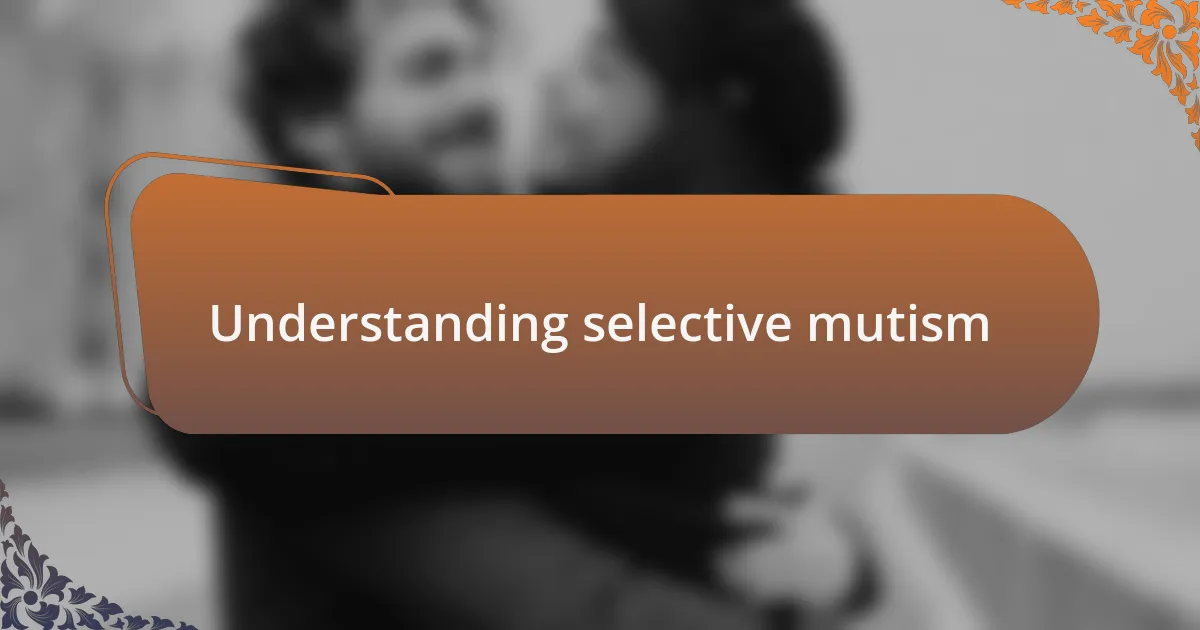
Understanding selective mutism
Selective mutism is a complex anxiety disorder often seen in children, characterized by an inability to speak in specific social situations despite having the ability to speak in other contexts, like at home. I remember working with a child who was bubbly and talkative around family but would freeze in the classroom, completely silent. It made me wonder: how can a child feel so safe in one environment yet paralyzed by fear in another?
This condition isn’t just about shyness; it stems from intense anxiety, leading to feelings of isolation and frustration. I’ve seen firsthand how this internal struggle can leave both the child and their parents feeling confused and helpless. Can you imagine wanting to share your thoughts but feeling like your voice is trapped?
Understanding selective mutism means recognizing that it’s not simply a phase or a refusal to talk; it’s a vital communication challenge. I’ve often felt that this misunderstanding can compound the problem, creating an even greater wall between the child and the world around them. Engaging with the child on their terms, and finding ways to encourage expression, can feel like a daunting but necessary journey.
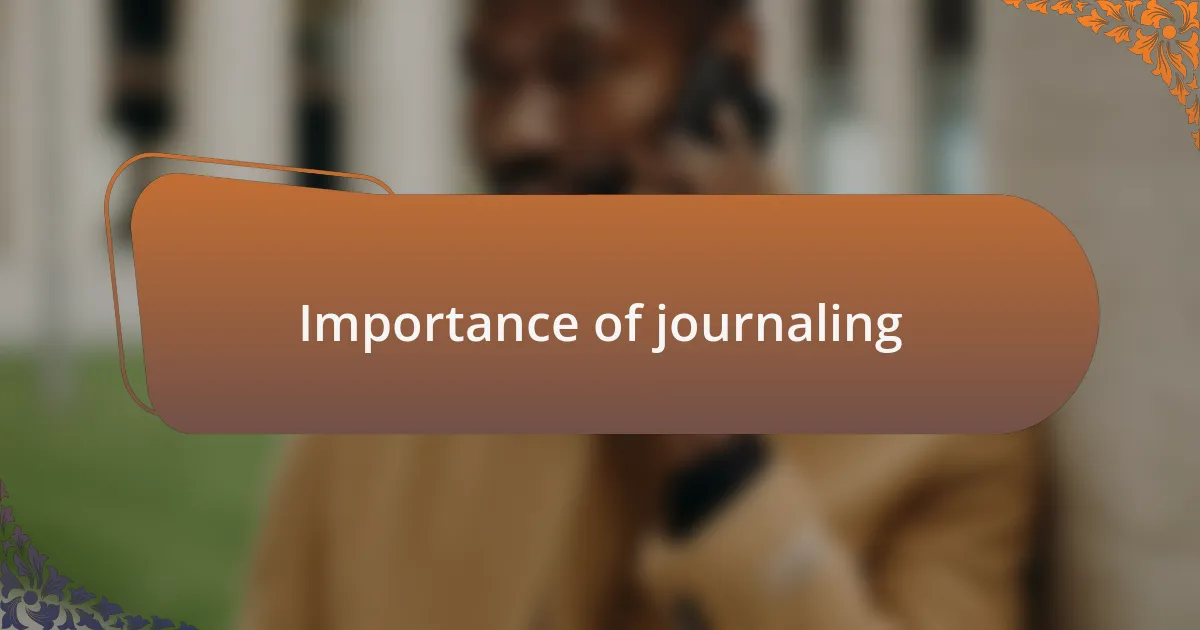
Importance of journaling
Journaling serves as a safe haven for individuals with selective mutism, providing a unique outlet for expression when verbal communication feels daunting. I often found that the pressing feelings of frustration and isolation could be transformed into written thoughts, allowing for a clearer understanding of my emotions. Isn’t it fascinating how putting pen to paper can unlock a flood of ideas that might otherwise remain silenced?
Through journaling, I’ve seen people articulate their innermost feelings without the fear of judgment. I recall encouraging one young girl, who struggled to share her thoughts in class, to write letters to her favorite characters. This simple act not only built her confidence but also created a bridge to verbal expression in a gentle, non-threatening manner. Could writing really be the key to finding one’s voice?
Moreover, journaling fosters self-reflection, helping individuals to navigate the complexities of their internal worlds. By regularly documenting thoughts and experiences, I discovered patterns in anxiety triggers, offering insights into the emotional landscape that words sometimes fail to capture. How much easier is it to confront our fears when we can see them laid out before us?
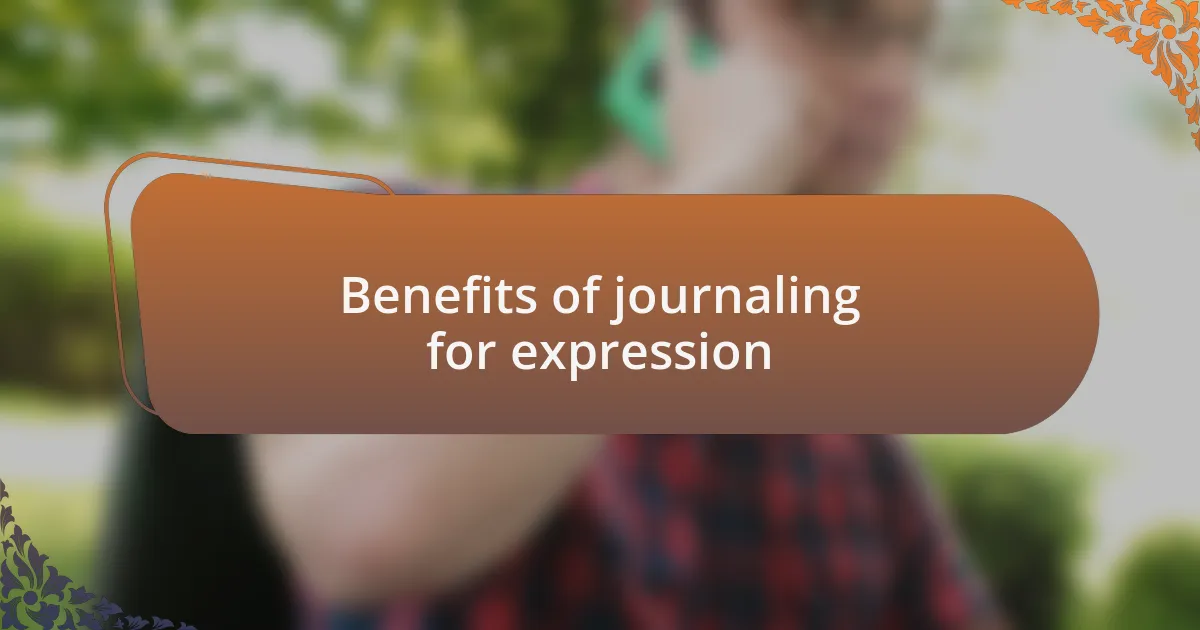
Benefits of journaling for expression
Journaling can be an incredible tool for unlocking our thoughts. I remember a time when I felt swallowed by anxiety, unable to voice my worries. Writing about them made those feelings tangible, almost like releasing steam from a pressure cooker. Have you ever felt that sense of relief when you finally get your thoughts onto paper?
One remarkable benefit is the opportunity to process complicated emotions. While helping a friend who struggled with selective mutism, I suggested she document her daily experiences. She later shared that the act of writing helped her untangle feelings that would often spiral into confusion. It’s as if she found a way to have a conversation with herself, allowing clarity to shine through the clutter.
Additionally, journaling can serve as a powerful record of growth. I often flip back through my old entries, marveling at how far I’ve come. In many cases, I can trace bold changes in my emotional health to specific written realizations. Isn’t it inspiring to see just how much we can evolve when we take the time to reflect on our journeys?
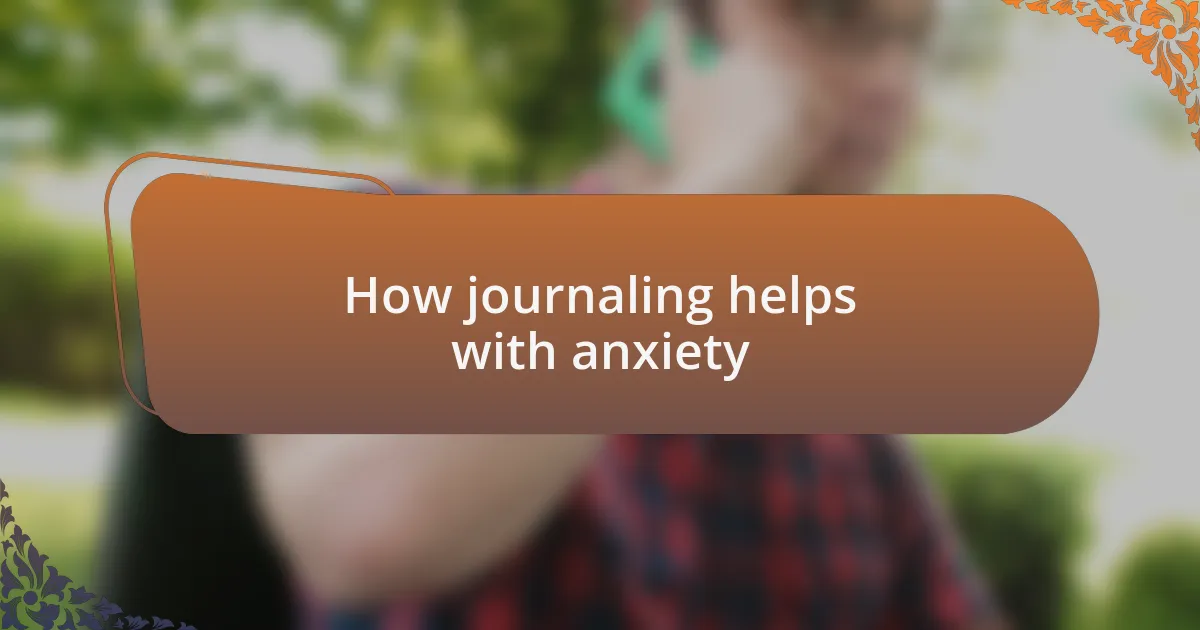
How journaling helps with anxiety
Journaling has a unique way of addressing anxiety that I’ve found profoundly effective. During particularly anxious moments, jotting down my thoughts transforms chaotic feelings into organized reflections. I often ask myself, “What’s really bothering me?” and the answers appear on the page, grounding me in reality rather than allowing my mind to spiral out of control.
There have been evenings when I felt the weight of uncertainty pressing down like a heavy blanket. Writing about my fears helped me break that cycle. By detailing what I was anxious about, I discovered that many of my worries were exaggerated, almost like shadows that disappeared in the light of day. Have you ever noticed how defining a fear can make it feel less daunting?
When I revisit my journal entries from those anxious times, I feel a sense of empowerment. Each page is a testament to how far I’ve come. It’s like building a bridge between my past and present, reassuring me that I can navigate my feelings. Don’t you think that recognizing your growth can be the best antidote to anxiety?
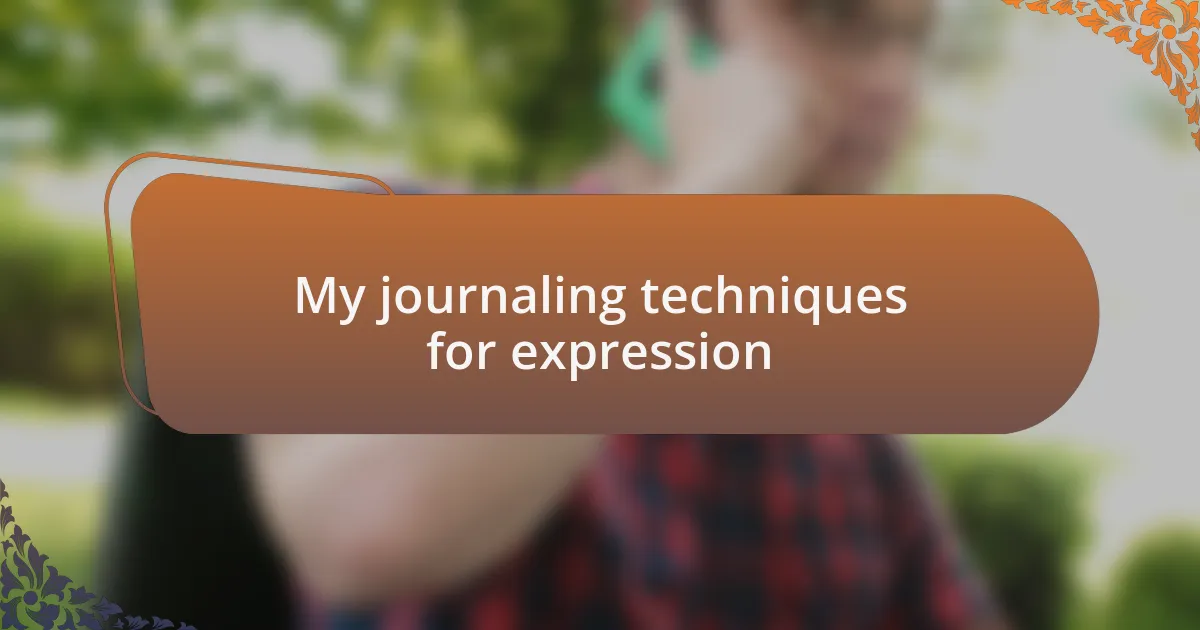
My journaling techniques for expression
When I sit down to journal, I often start with free writing, letting my thoughts spill onto the page without any restrictions. This technique can be liberating, as it allows me to express myself freely, bypassing the critical voice that often holds me back. Have you ever found that just letting the pen move can lead to unexpected insights about your feelings?
Sometimes, I use prompts, especially when I feel stuck. For instance, I might ask myself how certain situations make me feel or what memories they trigger. Recently, I wrote about a moment of silence in a crowded room, and it led me to explore feelings of isolation that I hadn’t fully acknowledged. It’s amazing how a simple question can unlock emotions I didn’t know were there.
The beauty of my journaling practice is in its evolution; I now incorporate sketches and doodles alongside my text. Visual expression adds depth, allowing me to convey feelings that words sometimes fail to capture. Have you tried blending different forms of expression? I find that drawing complements my writing beautifully, making my journaling a more holistic experience.
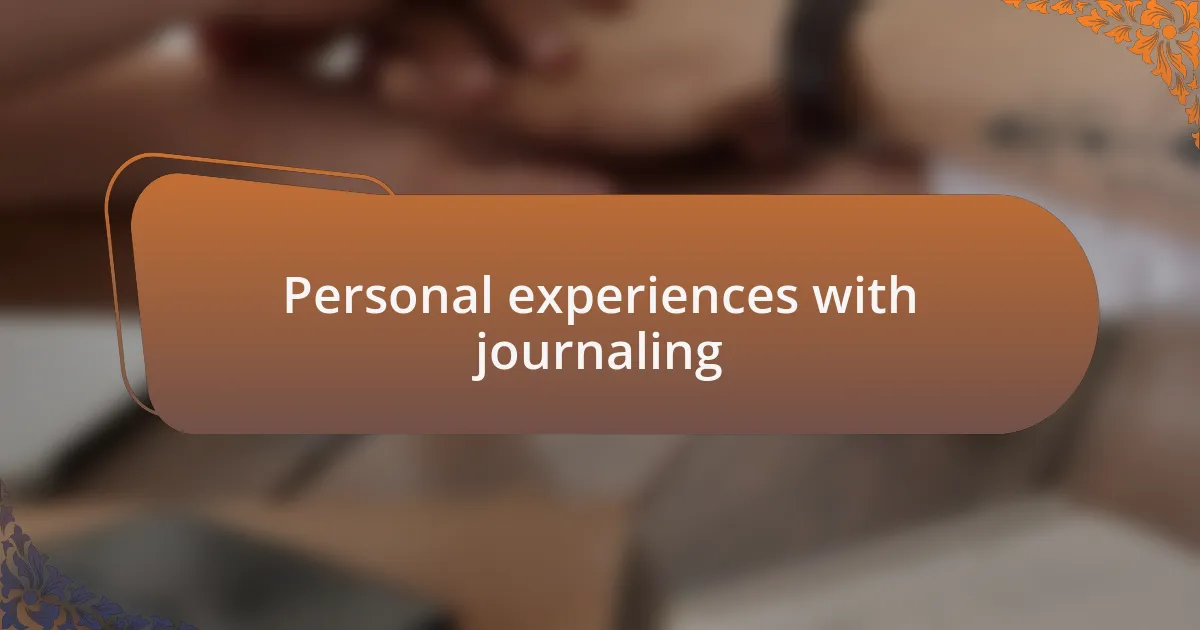
Personal experiences with journaling
I remember a time when journaling helped me process a particularly challenging day at school. After an intense week of silence, I sat down and poured out my frustrations onto the page. Writing about my experience felt like lifting a weight off my chest, revealing just how much I needed that release.
One poignant memory stands out: during a difficult phase, I wrote letters in my journal, addressing my fears as if they were friends. This helped to soften their presence and made them feel less daunting. Have you ever tried writing to your fears? It’s surprising how personalizing these emotions can lead to a greater understanding of their impact on your life.
Reflecting on my journey with journaling, I notice how it has been a companion in moments of both joy and pain. I still revisit old entries, and it feels like having a conversation with my past self. Each page is a reminder of how far I’ve come, urging me to embrace the evolving nature of my thoughts and feelings. How has your journaling experience shaped your perspective?
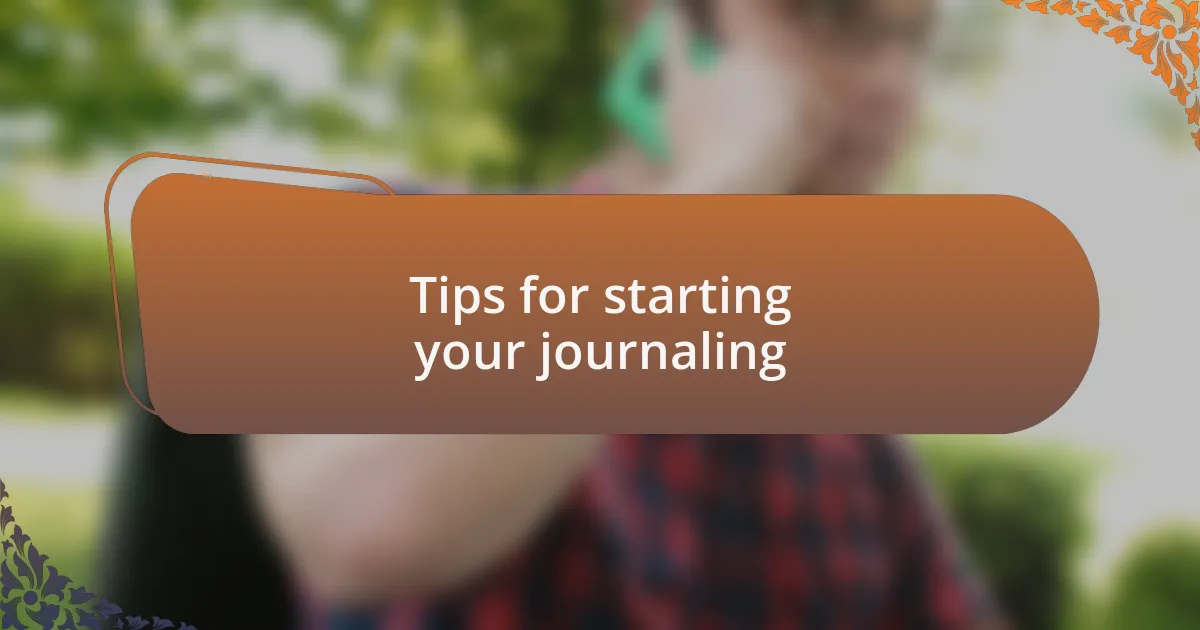
Tips for starting your journaling
When starting your journaling journey, consider setting a specific time each day just for this purpose. For me, the early morning is often the best moment to gather my thoughts before the day takes over. Have you thought about how establishing a routine can make journaling feel like a cherished ritual rather than a chore?
It can help to start with prompts if you’re unsure what to write about. I remember when I first began, using simple questions like “What made me smile today?” or “What am I grateful for?” helped to break the ice and unleash my thoughts. Have you found that having a starting point eases the pressure of the blank page?
Lastly, don’t worry about perfection. Your journal is a private space where you can express yourself freely, without judgment. I once filled a page with doodles and half-formed ideas, and looking back, I realized those messy entries captured a raw honesty I often overlook in my daily interactions. What cluttered thoughts could find clarity in your writing?